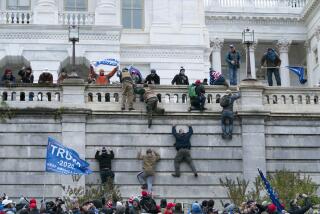Did Yeltsin Do Away With Democracy--or the Relics of Communism? : At Square One, but Moving Forward : Liberalizer: The greatest blow he can now strike for democracy is to start phasing out the old hard-liners for good.
As the smoke clears from Boris Yeltsin’s defeat of the Moscow insurrection of Oct. 2-3, what are Russia’s chances for democracy? In formal terms, the country is back at square one. Russia now has no constitution, no legislative branch and no constitutional court. All it has to build on is a democratically elected executive and charismatic master-of-crises. Yet, despite widespread apprehension at such a situation, this should prove enough to get at least to square two, if not all the way to a fully functioning democracy. The founding period of a democracy is not like that of its later, routine operation, and we should not judge Russia according to our own mature standards.
First, we will see legislative elections (roughly) in December, with presidential elections in June; and this is the proper sequence, precisely for the reasons of governmental continuity Yeltsin has advanced. His whole career since 1989 has been built on promoting democratic elections, and at age 62 he is not about to destroy his work by turning to personal despotism.
Second, there will be a short state of emergency in Moscow, with a number of the more incendiary “red-brown” (communist-fascist) newspapers, such as Pravda or Den, temporarily closed, and some extremist groups banned. But for good cause: There has just been an attempted insurrection to restore communism, and there are still snipers and other “lumpen” elements loose. In such circumstances, any other government would do the same. But these restrictions will be only temporary, as were similar measures in August, 1991. Yeltsin has neither the will nor the means to establish permanent controls.
Third, the regions are not going to bolt the federation or refuse to organize elections. On the contrary, they are beginning to return to the federal fold. Russia has a tradition of admiration for strong rulers, and Yeltsin, for all his commitment to democracy, has just demonstrated that he is a very decisive leader. Polls show this has earned him a new authority, so the little Khasbulatovs in regional councils are now poorly positioned to defy him.
Indeed, these bodies, elected like the central Parliament in 1990 and dominated by communist holdovers, are now slated for replacement in the December elections with normal legislatures. During the recent crisis, these soviets were Parliament’s chief weapon in its struggle to remove Yeltsin; they were all the more dangerous since the disintegrating army is often dependent on them for supplies. And, in a more general way, the experience of the past two years, both at the center and at the regions, has demonstrated that such a communist institution as a polity of soviets cannot be adapted to the purposes of a genuinely democratic order. Hence, Yeltsin will use the shock of the recent insurrection to recast regional government and renew its personnel.
Moreover, with Parliament gone, Yeltsin no longer needs so urgently the countervailing force of the regions to obtain a new constitution. He therefore intends to curtail the Federation Council of regional representatives, created last summer to serve as a future upper house of Parliament and an ad hoc constituent assembly. Finally, with the closure of the egregiously partisan constitutional court (another quasi-Soviet vestige), Yeltsin is now making a clean sweep of old institutions.
He is thus in the strongest position he has been in since August, 1991. And he clearly intends to use the constitutional interregnum until the December elections for some vigorous executive rule. This is a form of dictatorship, to be sure, but not the dictatorship of Stalin or Hitler; it is dictatorship in the original Roman sense of the term: a temporary trust of power to an individual for the duration of an emergency imperiling the republic’s existence. A post-totalitarian situation is by its nature an emergency transition to democracy. Yeltsin has set the limit of his exceptional powers by announcing December elections.
And his grand design for the interregnum? New political structures and elections at national and local levels are only half of it. The clear signal of the other half came together with the Sept. 21 dissolution of Parliament: Yegor Gaidar’s return as first deputy prime minister for the economy and the assumption of presidential control of the Central Bank. In other words, Yeltsin intends to use his current guardianship to resume the offensive of marketization and privatization so long thwarted by Parliament, thereby receiving the much-needed next installment of IMF aid.
The current crisis in Russia was not created because the pace of reform was too rapid; rather it occurred because, though communism is gone, the Communists are still there. Thus the greatest blow Yeltsin can now strike for democracy is to start phasing them out for good. And this means using his pre-electoral window of opportunity to reaccelerate the pace of the anti-totalitarian revolution begun in August, 1991.
More to Read
Sign up for Essential California
The most important California stories and recommendations in your inbox every morning.
You may occasionally receive promotional content from the Los Angeles Times.










